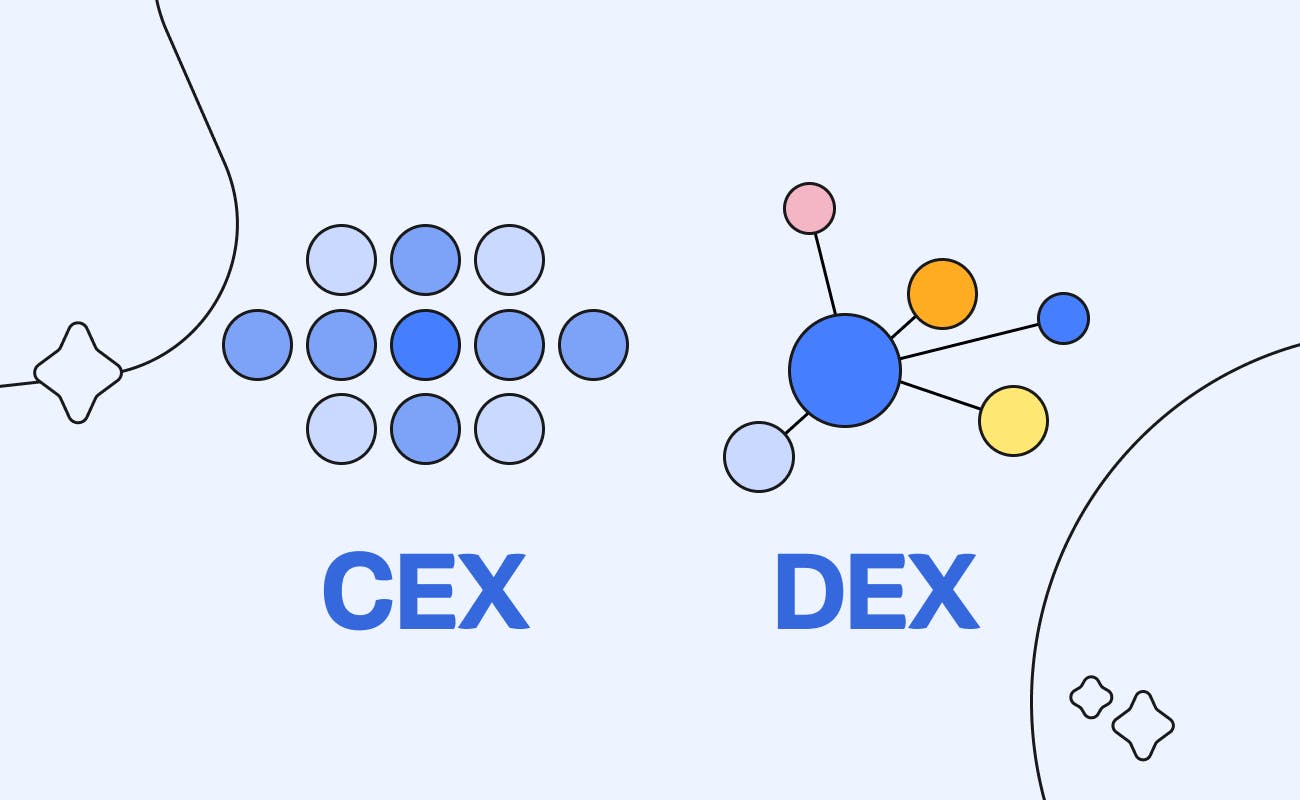Academy
Differences between CEX and DEX

The cryptocurrency market has evolved significantly since the inception of Bitcoin. With many digital assets now available, crypto enthusiasts face a choice between traditional centralized exchanges (CEXs) and emerging decentralized exchanges (DEXs), each offering unique advantages and challenges.
What is a centralized exchange (CEX)?
Centralized exchanges operate similarly to traditional stock exchanges such as NYSE or NASDAQ. They are managed by a single entity, maintaining an order book where users can place buy and sell orders. Examples of CEXs include Binance, Kucoin, and Gate.io.
Pros of CEXs
- User-Friendly Interface: CEXs boast intuitive interfaces suitable for both beginners and experienced traders.
- High Liquidity: With substantial trading volumes, CEXs facilitate large trades without significantly affecting asset prices.
- Extensive Asset Selection: Users can access a diverse range of cryptocurrencies and fiat-to-crypto trading pairs on CEXs.
- Dedicated Support: CEXs often provide dedicated customer support to address user inquiries promptly.
- Regulatory Compliance: CEXs adhere to regulatory standards, ensuring compliance with anti-money laundering (AML) and know-your-customer (KYC) regulations.
- Advanced Tools: Professional traders benefit from advanced trading tools and charting software available on CEX platforms.
Cons of CEXs
- Security Risks: CEXs are vulnerable to hacking attempts, leading to the loss of user assets. Instances like the Mt. Gox hack serve as cautionary tales.
- Privacy Concerns: Users must provide personal information for KYC compliance, raising privacy concerns.
- Dependence on the Exchange: CEXs control user private keys, limiting asset accessibility.
- Technical Issues: Platform downtime or technical glitches can disrupt trading and result in financial losses.
- Fraud and Mismanagement: Some CEXs have been involved in fraudulent activities or mismanagement of user funds.
- Higher Fees: CEXs typically charge higher fees than DEXs for trading and withdrawals.
- Regulatory Risk: Government regulations can impact CEX operations and user access.
What is a decentralized exchange (DEX)?
DEX is a decentralized cryptocurrency exchange platform, meaning it operates without a central authority or intermediary. In a DEX, users can trade cryptocurrencies directly with each other on a peer-to-peer basis without needing a trusted third party to facilitate transactions. DEX platforms typically utilize smart contracts or decentralized protocols to enable trading and provide liquidity, offering users greater control over their funds and reducing the risks associated with centralized exchanges, such as hacking or manipulation.
Pros of DEXs
- Asset Control: Users retain control over their private keys, facilitating independent transactions.
- Enhanced Security: Decentralization reduces vulnerability to hacking and eliminates single points of failure.
- Privacy Emphasis: DEXs do not require personal information, offering enhanced privacy.
- Transparency: Transactions on DEXs are recorded on the blockchain, ensuring transparency.
- Censorship Resistance: DEXs are less susceptible to censorship or government intervention.
- Cost Efficiency: DEXs typically feature lower trading and withdrawal fees compared to CEXs.
Cons of DEXs
- Lower Liquidity: DEXs often have lower trading volumes, potentially affecting trade execution for large orders.
- Complex Interfaces: DEX platforms may have less intuitive interfaces, posing challenges for newcomers.
- Limited Asset Selection: DEXs are confined to trading pairs on the same blockchain, limiting asset diversity.
- Lack of Customer Support: DEX platforms may lack dedicated customer support teams, affecting issue resolution.
- Interoperability Challenges: Cross-chain trading remains a challenge for DEXs, restricting asset accessibility.
Navigating the choice
CEXs and DEXs offer distinct advantages and drawbacks, catering to different user preferences and priorities. As the cryptocurrency market evolves, staying informed about the latest developments and regulatory changes is crucial for making informed decisions.
Conclusion
The choice between CEXs and DEXs depends on security, privacy, liquidity, and user experience. By understanding the nuances of each type of exchange, crypto enthusiasts can confidently navigate the evolving landscape of cryptocurrency trading.


